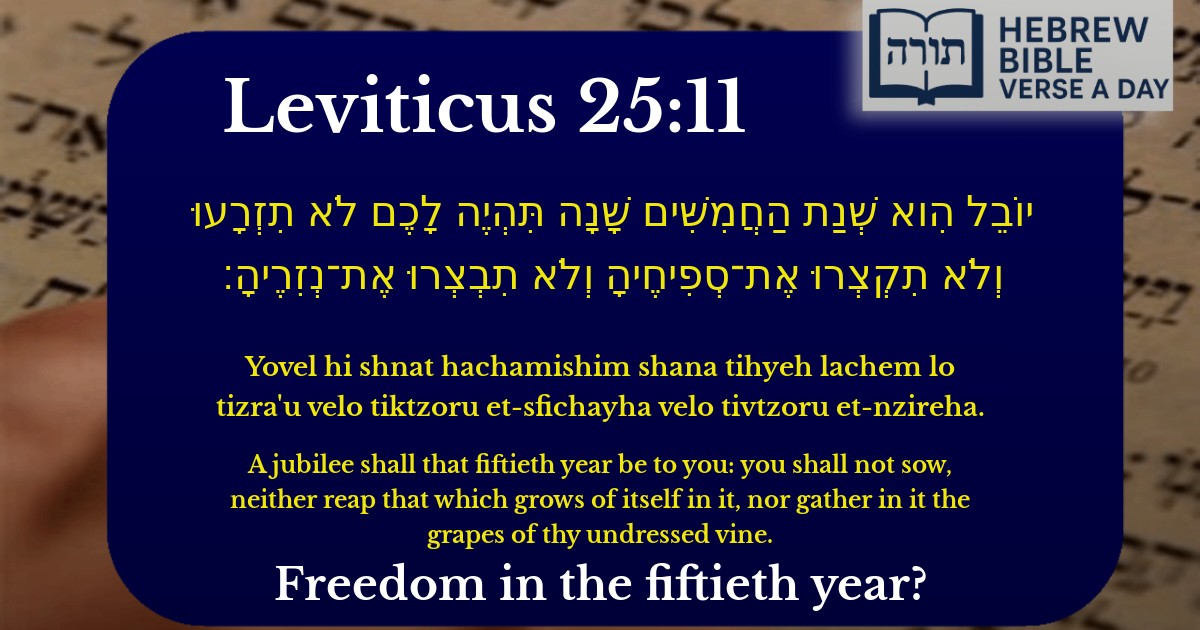Join Our Newsletter To Be Informed When New Videos Are Posted
Join the thousands of fellow Studends who rely on our videos to learn how to read the bible in Hebrew for free!
Hebrew Text
יוֹבֵל הִוא שְׁנַת הַחֲמִשִּׁים שָׁנָה תִּהְיֶה לָכֶם לֹא תִזְרָעוּ וְלֹא תִקְצְרוּ אֶת־סְפִיחֶיהָ וְלֹא תִבְצְרוּ אֶת־נְזִרֶיהָ׃
English Translation
A jubilee shall that fiftieth year be to you: you shall not sow, neither reap that which grows of itself in it, nor gather in it the grapes of thy undressed vine.
Transliteration
Yovel hi shnat hachamishim shana tihyeh lachem lo tizra'u velo tiktzoru et-sfichayha velo tivtzoru et-nzireha.
Hebrew Leining Text
יוֹבֵ֣ל הִ֗וא שְׁנַ֛ת הַחֲמִשִּׁ֥ים שָׁנָ֖ה תִּהְיֶ֣ה לָכֶ֑ם לֹ֣א תִזְרָ֔עוּ וְלֹ֤א תִקְצְרוּ֙ אֶת־סְפִיחֶ֔יהָ וְלֹ֥א תִבְצְר֖וּ אֶת־נְזִרֶֽיהָ׃
יוֹבֵ֣ל הִ֗וא שְׁנַ֛ת הַחֲמִשִּׁ֥ים שָׁנָ֖ה תִּהְיֶ֣ה לָכֶ֑ם לֹ֣א תִזְרָ֔עוּ וְלֹ֤א תִקְצְרוּ֙ אֶת־סְפִיחֶ֔יהָ וְלֹ֥א תִבְצְר֖וּ אֶת־נְזִרֶֽיהָ׃
🎵 Listen to leining
Parasha Commentary
📚 Talmud Citations
This verse is quoted in the Talmud.
📖 Arakhin 29b
The verse is discussed in the context of the laws of the Jubilee year, particularly regarding the prohibition of agricultural work during this year.
📖 Rosh Hashanah 8b
The verse is referenced in a discussion about the counting of years for the Jubilee and the Sabbatical year.
📖 Moed Katan 2b
The verse is mentioned in relation to the prohibitions of agricultural labor during the Jubilee year.


The Concept of Yovel (Jubilee)
The verse describes the sanctity of the Yovel (Jubilee) year, the fiftieth year in the cycle of the Shmita (Sabbatical) years. According to the Torah (Vayikra 25:11), the Yovel year is a time of spiritual and agricultural renewal, where the land rests, slaves are freed, and ancestral lands are returned to their original owners. The prohibition against sowing, reaping, and harvesting grapes underscores the holiness of this time, akin to the Shabbat for the land.
Agricultural Prohibitions in Yovel
Rashi (Vayikra 25:11) explains that the phrase "לֹא תִזְרָעוּ" ("you shall not sow") refers to a complete cessation of agricultural work, just as in the Shmita year. The phrase "וְלֹא תִקְצְרוּ אֶת־סְפִיחֶיהָ" ("nor reap that which grows of itself") prohibits harvesting even the naturally growing produce, as it is considered ownerless (hefker) and must be available to all. The Rambam (Hilchot Shemita v’Yovel 10:8) further clarifies that the Yovel year carries the same agricultural restrictions as Shmita, reinforcing its sanctity.
The Undressed Vine (נְזִרֶיהָ)
The term "נְזִרֶיהָ" ("undressed vine") refers to grapes that grow without cultivation. The Sifra (Behar 3:1) interprets this as a prohibition against harvesting grapes that grow wild during Yovel, as they too are considered ownerless. The Talmud (Rosh Hashanah 9b) discusses whether Yovel is counted as the first year of the next cycle or the last of the previous one, highlighting its unique status in the agricultural and calendrical system.
Spiritual and Social Significance
The Yovel year serves as a reminder of divine ownership of the land (Vayikra 25:23) and reinforces social justice by ensuring economic equity. The Rambam (Hilchot Shemita v’Yovel 10:3) emphasizes that Yovel is a time of freedom and restoration, where all Israelites return to their ancestral inheritance. The Midrash (Torat Kohanim 25:7) connects Yovel to the sounding of the shofar, symbolizing liberation and divine sovereignty.
Key Teachings from Yovel